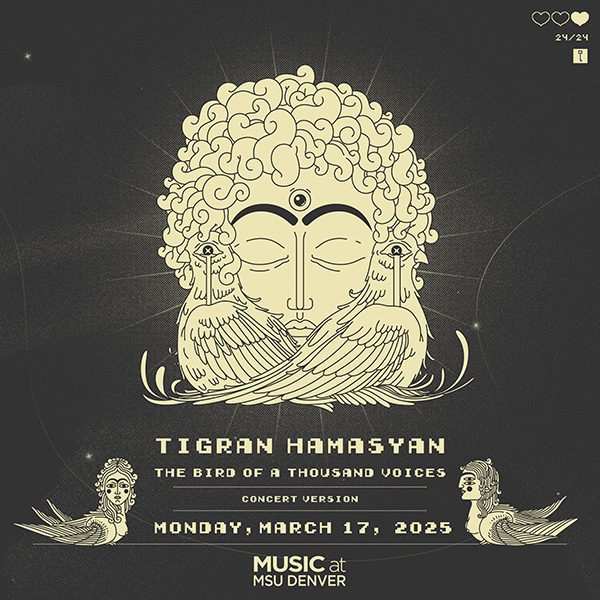Request Information
Ready to find out what MSU Denver can do for you? We’ve got you covered.
The MSU Denver Department of Music, with support from the Office of Diversity and Inclusion, presents the Visiting Artist Series on Music, Race, & Social Justice. Organized by Dr. Elizabeth McLean Macy, Associate Professor of Ethnomusicology and Faculty Fellow in the Office of Diversity and Inclusion, this series highlights the work of BIPOC musicians, performers, and scholars.

Monday, March 17
Music, Race, and Social Justice Visiting Artist Series presents
Tigran Hamasyan: The Bird of a Thousand Voices (Concert Version)
Tigran Hamasyan, piano/keyboards
Yessaï Karapetian, keyboards; Marc Karapetian, bass; Matt Garstka, drums
King Center Concert Hall
7:30 pm, Tickets $40, $35, $30
Free Masterclass with Tigran Hamasyan: Monday, March 17 at 2:30 pm in the King Center Recital Hall
Tigran is one of the most remarkable jazz pianists and composers of his generation. He combines improvisation with the rich traditional music of his native Armenia. Last year, Hamasyan composed his greatest work, inspired by a traditional Armenian tale of the same name: The Bird of a Thousand Voices, ‘Hazaran Blbul’ in Armenian. He is rediscovering this story in a transmedia project, consisting of an innovative livestaged play, two ambitious cinematic fiction music videos, a documentary music video and an online game directed by Ruben Van Leer. The original story of Hazaran Blbul has been orally transmitted over the centuries and cultures. The folk tale requires a multi-layered, transdisciplinary approach to provide an artistic context for this fascinating story. The mystical bird of a thousand voices is a beautiful metaphor of our times: a world in search of connection and harmony, faced with ecological, psychological and spiritual crises. Any form of recognition and new means of transmitting this beautiful music of the ancient traditions of the Caucasus is therefore important and sets the tone for world curiosity and diversity. “The Bird Of A Thousand Voices” is part of this context. This concert version performance will feature Hamasyan’s musical compositions only – the fully realized staged version of the project will be presented in Belgium and Germany this year.
Play the online game inspired by The Bird of a Thousand Voices
Venture into the magical world of the mythical bird and experience Hamasyan’s unique music in an interactive online game experience > Play Now
‘Areg & Manushak’ Documentary Music Video
'The Quest Begins'

Monday, April 28
Music, Race, and Social Justice Visiting Artist Series
Lead Guitar Showcase Concert
St Cajetan’s Church, 855 Lawrence Way
6:00 pm, Free and Open to the Public
leadguitar.org
Lead Guitar is a national non-profit organization that partners with public schools to establish free in-school guitar ensemble classes. Lead Guitar provides partner schools with a culturally responsive guitar curriculum, weekly co-teaching from a team of Teaching Artists, and professional development for music teachers. The Denver Showcase Concert features student performances from Lead Guitar programs in local Denver elementary, middle, and high schools. A capstone experience like the Showcase Concert provides students in a Lead Guitar ensemble class the opportunity to realize learning objectives, such as following a conductor, exhibiting poise and self-confidence, and applying teamwork skills to execute a challenging performance.
Check out past livestreams from the Music, Race, and Social Justice Visiting Artist Series or revisit your favorites.
View Past Livestreams